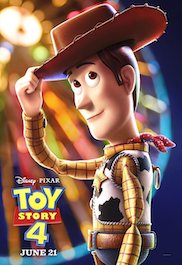The wonderfully counter-cultural message of Toy Story 4
- DON JOHNSON
Here is why I will be picking up a copy for my family when it is released on video this week.
 I admit, the trailers for Toy Story 4 made me apprehensive when I saw them earlier this year. A Hollywood blockbuster about a plastic spork now living life as a child's toy? It sounded like the perfect set up for a message about the joys of self-identifying as whatever you want to be, or some similar contemporary cultural cliche. That's the last thing I wanted from such a brilliant movie franchise.
I admit, the trailers for Toy Story 4 made me apprehensive when I saw them earlier this year. A Hollywood blockbuster about a plastic spork now living life as a child's toy? It sounded like the perfect set up for a message about the joys of self-identifying as whatever you want to be, or some similar contemporary cultural cliche. That's the last thing I wanted from such a brilliant movie franchise.
I should have had more faith in the geniuses at Pixar. Toy Story 4 turned out to be so contrary to my expectations that I was left wondering how the filmmakers managed to get such a traditional and wonderfully counter-cultural message past the various studio gatekeepers.
Here is why I will be picking up a copy for my family when it is released on video this week.
The Toy Story films have always been about the meaning of life. From the first appearance of Buzz Lightyear in the original movie, Woody and the gang have struggled to answer the big questions: What are we? Why are we here? How does it look to live out that truth?
In the first installment, for example, the story revolves around Woody's attempt to convince Buzz that he is actually a child's play character and not a real space ranger. Through a series of painful experiences, Buzz overcomes prideful and dangerous self-delusion, finally submitting himself to reality.
One of the main benefits of that, of course, was that Buzz'z life would now be safer. He had to realize that he couldn't actually fly, that his lasers were really just light bulbs, and that his space suit wasn't suited for space at all. To hang onto his previous false beliefs would ultimately get him destroyed.
But beyond just avoiding danger, submitting to the truth brought Buzz contentment and a whole new level of joy. That is because he was created for a purpose — to love and be loved by his child — and by conforming his beliefs and actions to that essential fact, Buzz found fulfillment in life. It turns out that his creator had a good plan for him, and conforming to that plan brought true happiness.
Toy Story 4 has a very similar narrative trajectory. This time, the character facing the existential crisis is Forky, a disposable hybrid utensil that was given sentient life when kindergarten-aged Bonnie formed it into her companion using glue, googly eyes, and some pipe cleaners. Unfortunately for Forky, he refuses to believe that he is a toy, created to love and be loved by Bonnie. Rather, he sees himself as trash, a cheap tool meant to be used once and thrown away.
Thankfully, just as he did with Buzz, Woody jumps in to try to convince Forky of the truth: that in his essence, Forky is a beloved toy. The main difference between Buzz and Forky is that Buzz had too high a view of himself, while Forky has too low a view. As such, instead of trying to keep Buzz from jumping off structures because he thinks he can fly, Woody tries to keep Forky from jumping off structures because he wants to "kill" himself and get back into a trashcan.
That is because he was created for a purpose — to love and be loved by his child — and by conforming his beliefs and actions to that essential fact, Buzz found fulfillment in life.
Watching Toy Story 4, I was struck by just how contrary it is to the prevailing cultural narrative. After all, who does Woody think he is, telling anyone else what their self-identity should be? Shouldn't he be affirming them in whatever they believe? If Buzz thinks he's a space ranger, then he is one! If Forky believes he is a disposable tool to be used for someone else's pleasure, then no one has the right to step in and tell him different! Isn't everything supposed to be up for grabs, with no boundaries but the confines of an individual's naked will?
To suggest otherwise is to undermine almost everything about today's post sexual revolution moral landscape. The entire edifice, from hook-up culture to gender identity chaos, is predicated on the idea that there is no creator, we do not have a nature or essence to which we must conform, and life has no meaning other than what we create for ourselves.
But not only do the writers of Toy Story suggest otherwise, they make a very compelling and powerful case that it is all bunk, and dangerous bunk at that. Through the lives of the toys, we see that believing lies about yourself and the meaning of life is a dead end, emotionally, relationally, even physically.
They also present a beautiful alternative, one that turns out to be the Catholic answer to life's biggest question. Why are we here? Because our creator made us in his image, to love and be loved by him, and to love others in the same way.
How are we to do that? According to the dictates of our nature. Only by submitting to that reality, the details of which God has graciously revealed in Scripture and Church teaching, will we ever find contentment and true happiness.


 This is Meaghen Gonzalez, Editor of CERC. I hope you appreciated this piece. We curate these articles especially for believers like you.
This is Meaghen Gonzalez, Editor of CERC. I hope you appreciated this piece. We curate these articles especially for believers like you.
Please show your appreciation by making a $3 donation. CERC is entirely reader supported.

Acknowledgement
Don Johnson. "The wonderfully counter-cultural message of Toy Story 4." Catholic World Report (October 8, 2019).
Reprinted with permission. Catholic World Report is an online news magazine that tells the story from an orthodox Catholic perspective. Its hard-hitting content is free to all readers without a subscription.
The Author
 Don Johnson is an author, speaker, radio show host, and filmmaker. His latest projects include the documentaries Unprotected and Convinced as well as the book How to Talk to a Skeptic. You can find links to all of Don's work at donjohnsonministries.org.
Don Johnson is an author, speaker, radio show host, and filmmaker. His latest projects include the documentaries Unprotected and Convinced as well as the book How to Talk to a Skeptic. You can find links to all of Don's work at donjohnsonministries.org.




